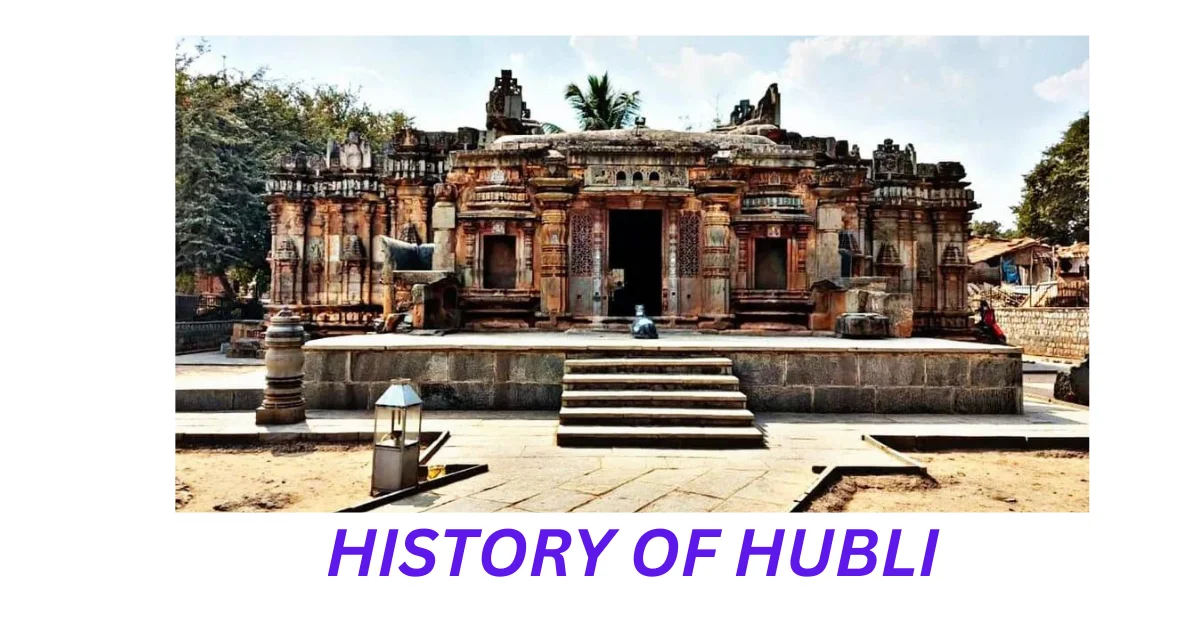Hubli is also known as Hubballi (which means “flowering creeper”), has a rich and diverse history.
It is located in Karnataka, India, it has evolved from a small village into one of the state’s major cities.
Hubli is known for its commercial strength and rapid growth, Hubli plays a key role in the region’s culture and economy.
Early Days
Hubli’s history goes back many centuries when it was called Rayara Hubli. The city grew because of its small industries and the trade of iron and saltpeter, making it an important commercial hub.
Its strategic location and thriving trade attracted various rulers and traders, helping it to develop and prosper.
Under Mughal and Nawab Rule
In the 17th century, Hubli came under the control of the Mughal Empire, which brought significant changes to the city.
Later, it was governed by the Nawab of Savanur, who built a new area called Majidpura, further expanding the city.
In 1727, trader Basappa Shettar founded the town and fort of New Hubli around the Durgadabail area of Rayara Hubli.
The renowned Moorusavira Matha in Hubli is believed to have been established by a follower of Basaveshwara during his era. In 1755–56, the Marathas captured Hubli from the Nawab of Savanur.
Maratha and Hyder Ali’s Conquests
Hubli’s strategic importance made it a sought-after prize for various regional powers. In 1755, the Marathas took control of the city.
However, Hyder Ali, the Sultan of Mysore, soon captured it. The Marathas recaptured Hubli in 1790. Each ruler left their mark on the city’s culture and infrastructure.
British Era
In the early 19th century, Hubli came under British control. In 1817, the British East India Company took over Old Hubli from the Peshwas and acquired New Hubli from the Sangli Patwardhan in 1820.
The British recognized Hubli’s potential and invested in its infrastructure, including setting up a railway workshop in 1880. This development helped transform Hubli into an industrial center, setting the stage for its modern growth.

Modern Times
Today, Hubli is a busy city known for its commercial dynamism and rapid growth.
It is often paired with its neighboring city, Dharwad, forming the Hubli-Dharwad twin cities.
Together, they are the second-largest urban area in Karnataka. Hubli’s journey from a small village to a major city shows its resilience and ability to adapt through various historical periods.
Hubli 2024
Location and Status
It holds significant importance in the region due to its economic and industrial contributions.
Commercial Significance
Often referred to as “Vanijya Nagari” (City of Commerce) and “Chota Mumbai” (Little Mumbai), Hubli is recognized as the commercial hub of Karnataka.
The city plays a crucial role in the state’s economy due to its extensive trade and commercial activities.
Industrial Landscape
Hubli boasts a vibrant industrial sector, with over 100,000 small and medium-sized industries operating within the city.
This industrial presence contributes significantly to the local economy and provides employment opportunities to a large number of people.
Demographics and Geography
As the second-largest city in Karnataka by both area and population, Hubli is a bustling urban center.
The city is situated at an elevation of 640 meters above sea level, which contributes to its moderate and pleasant climate.
Climate
Hubli experiences a tropical wet and dry climate, characterized by distinct wet and dry seasons.
The city receives an average annual rainfall of 838 mm, which supports its agricultural activities and maintains its lush greenery.
Educational Institutions
Hubli is home to several prestigious educational institutions that attract students from all over the country.
Notable institutions include KLE Technological University, known for its engineering programs, and the Karnataka Institute of Medical Sciences, a leading medical college and hospital in the region.
Also Read
Hubli is called as Chota Mumbai
Conclusion
The history of Hubli reflects its strategic importance and commercial strength.
From its early days as Rayara Hubli to its current status as a major city, Hubli has continually evolved and thrived.
Its rich history is a source of pride for its residents and an interesting story for historians and visitors alike.

